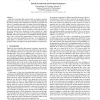Free Online Productivity Tools
i2Speak
i2Symbol
i2OCR
iTex2Img
iWeb2Print
iWeb2Shot
i2Type
iPdf2Split
iPdf2Merge
i2Bopomofo
i2Arabic
i2Style
i2Image
i2PDF
iLatex2Rtf
Sci2ools
106
click to vote
KI
2001
Springer
2001
Springer
Belief Update in the pGOLOG Framework
High-level controllers that operate robots in dynamic, uncertain domains are concerned with at least two reasoning tasks dealing with the effects of noisy sensors and effectors: They have a) to project the effects of a candidate plan and b) to update their beliefs during online execution of a plan. In this paper, we show how the pGOLOG framework, which in its original form only accounted for the projection of high-level plans, can be extended to reason about the way the robot’s beliefs evolve during the on-line execution of a plan. pGOLOG, an extension of the high-level programming language GOLOG, allows the specification of probabilistic beliefs about the state of the world and the representation of sensors and effectors which have uncertain, probabilistic outcomes. As an application of belief update, we introduce belief-based programs, GOLOG-style programs whose tests appeal to the agent’s beliefs at execution time.
Related Content
| Added | 30 Jul 2010 |
| Updated | 30 Jul 2010 |
| Type | Conference |
| Year | 2001 |
| Where | KI |
| Authors | Henrik Grosskreutz, Gerhard Lakemeyer |
Comments (0)

